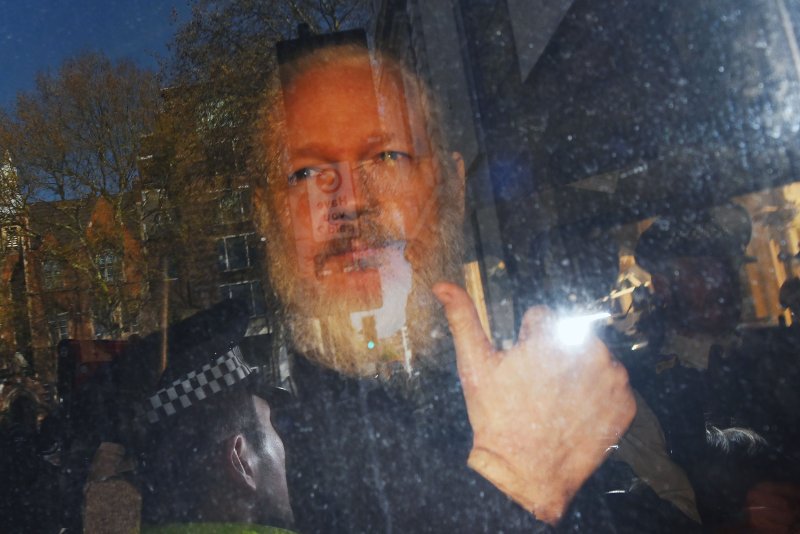Wikileaks co-founder Julian Assange arrives at Westminster Magistrates Court in London, Britain, on April 11 after he was arrested at the Ecuadorian Embassy. File Photo by EPA-EFE
May 31 (UPI) -- A United Nations expert said Friday a British court should not grant the United States extradition of WikiLeaks co-founder Julian Assange due to signs he's been "psychologically tortured."
In a report by the U.N. Human Rights Office of the High Commissioner, special rapporteur on torture Nils Melzer said the United States, Britain and Sweden have "ganged up" on Assange and subjected him to the psychological distress.
Assange missed a court date Thursday after his attorneys said he was too ill to appear at it via video link from the prison he is being held at.
Melzer points to 17 new charges against Assange under the Espionage Act to obtain classified documents as a reason to be skeptical about treatment, if extradited.
"My most urgent concern is that, in the United States, Mr. Assange would be exposed to a real risk of serious violations of his human rights, including his freedom of expression, his right to a fair trial and the prohibition of torture and other cruel, inhuman or degrading treatment or punishment," Melzer said in the report.
"I am particularly alarmed at the recent announcement by the U.S. Department of Justice of 17 new charges ... which currently carries up to 175 years in prison. This may well result in a life sentence without parole, or possibly even the death penalty, if further charges were to be added in the future."
Melzer told NBC News Thursday Assange is now in "constant panic" in British custody, after he lived at the Ecuadorian Embassy in London for seven years.
"You talk with him and he is extremely agitated," Melzer said. "He had all these questions: What's going on there? What is in this [legal] proceeding? And what's going to happen here? He's so preoccupied that he will bombard you with questions without waiting for answers."
In his report, Melzer said a nonstop campaign to damage Assange and his reputation has been waged since WikiLeaks started publishing reports on possible American war crimes in 2010.
"Since then, there has been a relentless and unrestrained campaign of public mobbing, intimidation and defamation against Mr. Assange, not only in the United States, but also in the United Kingdom, Sweden and, more recently, Ecuador," Melzer wrote.
A British representative said the government has worked closely with the U.N. and is committed to upholding the law.
"We support the important work of the special rapporteur's mandate and will respond to his letter in due course, but we disagree with a number of his observations. Judges are impartial and independent from government, with any judgment based solely on the facts of the case and the applicable law. The law provides all those convicted with a right of appeal."















